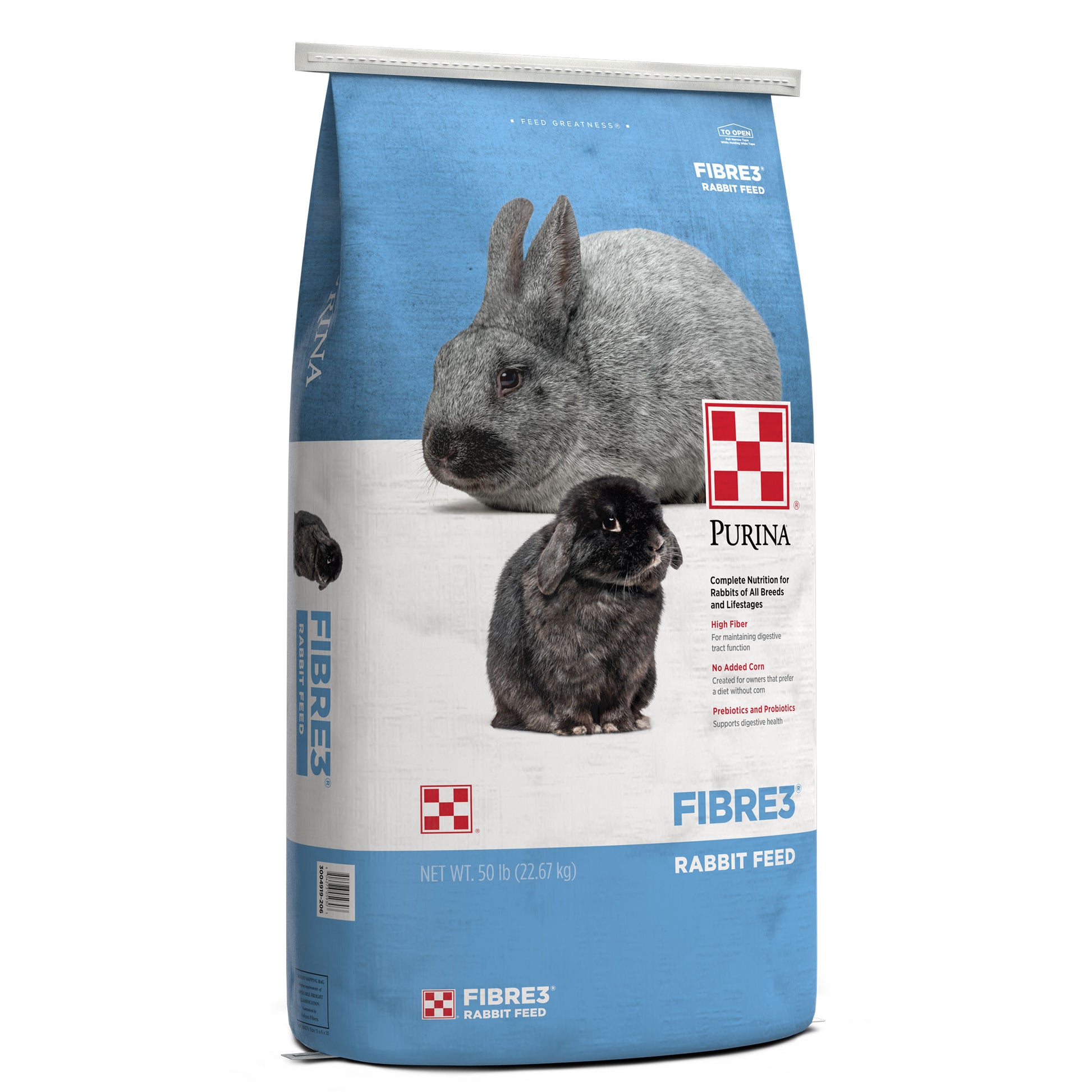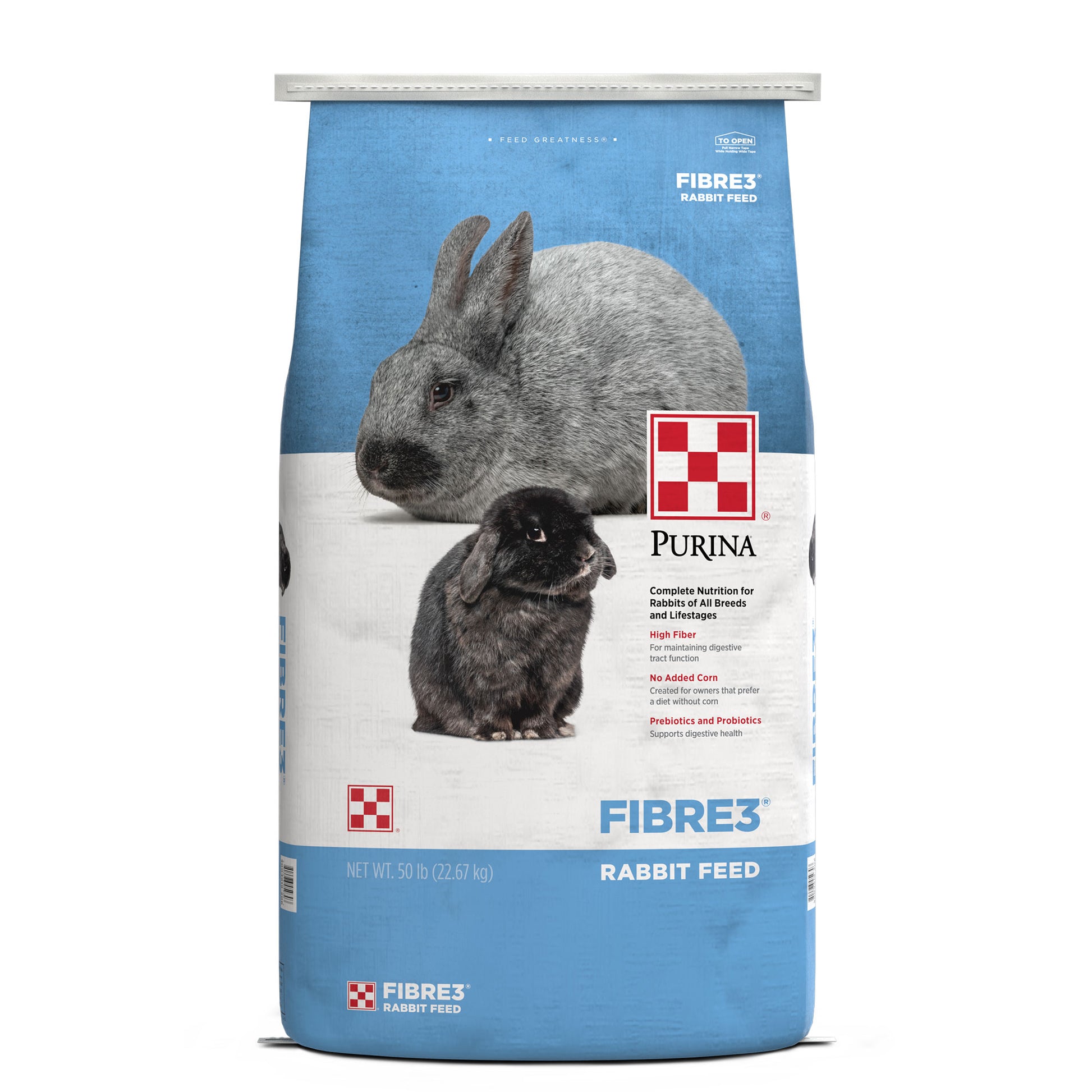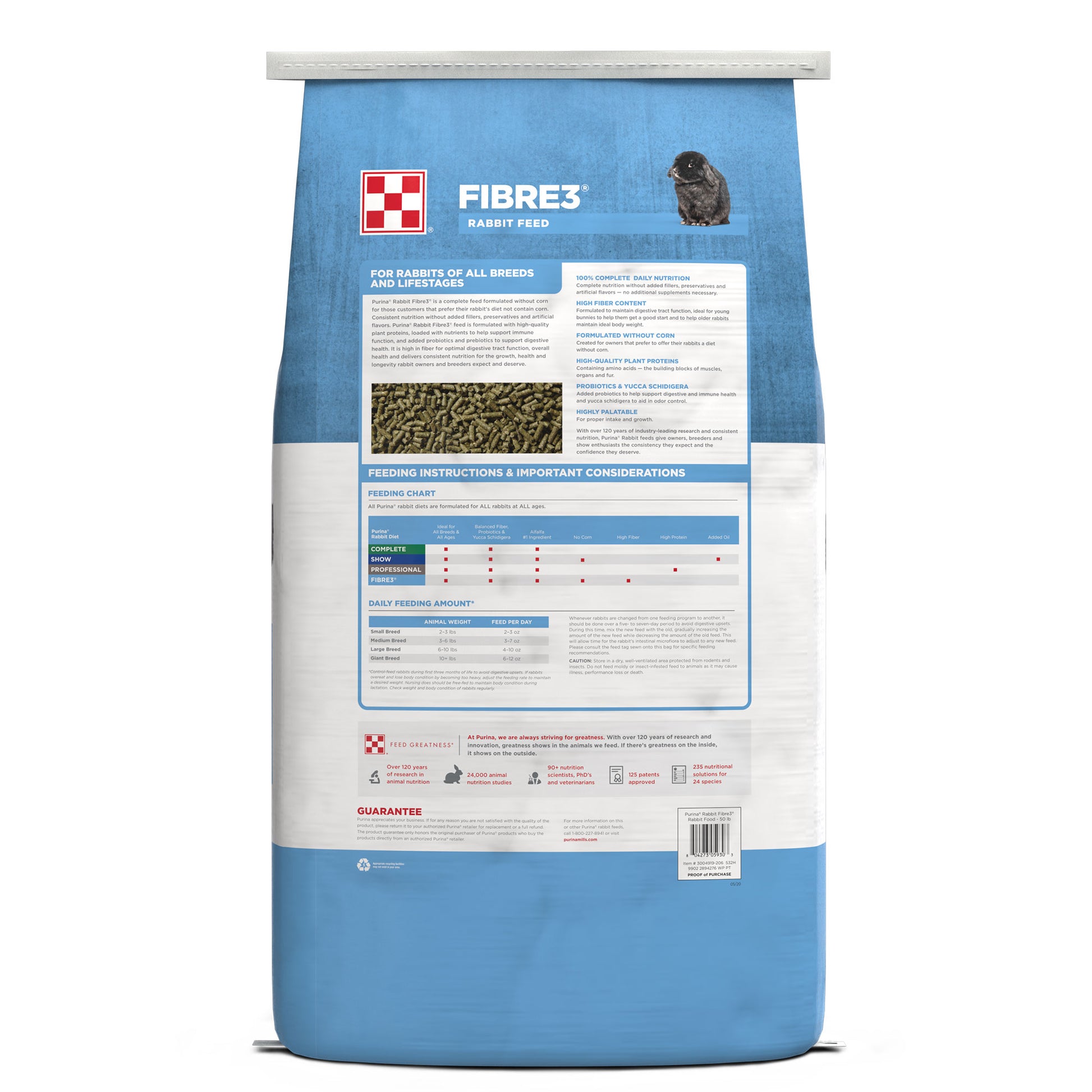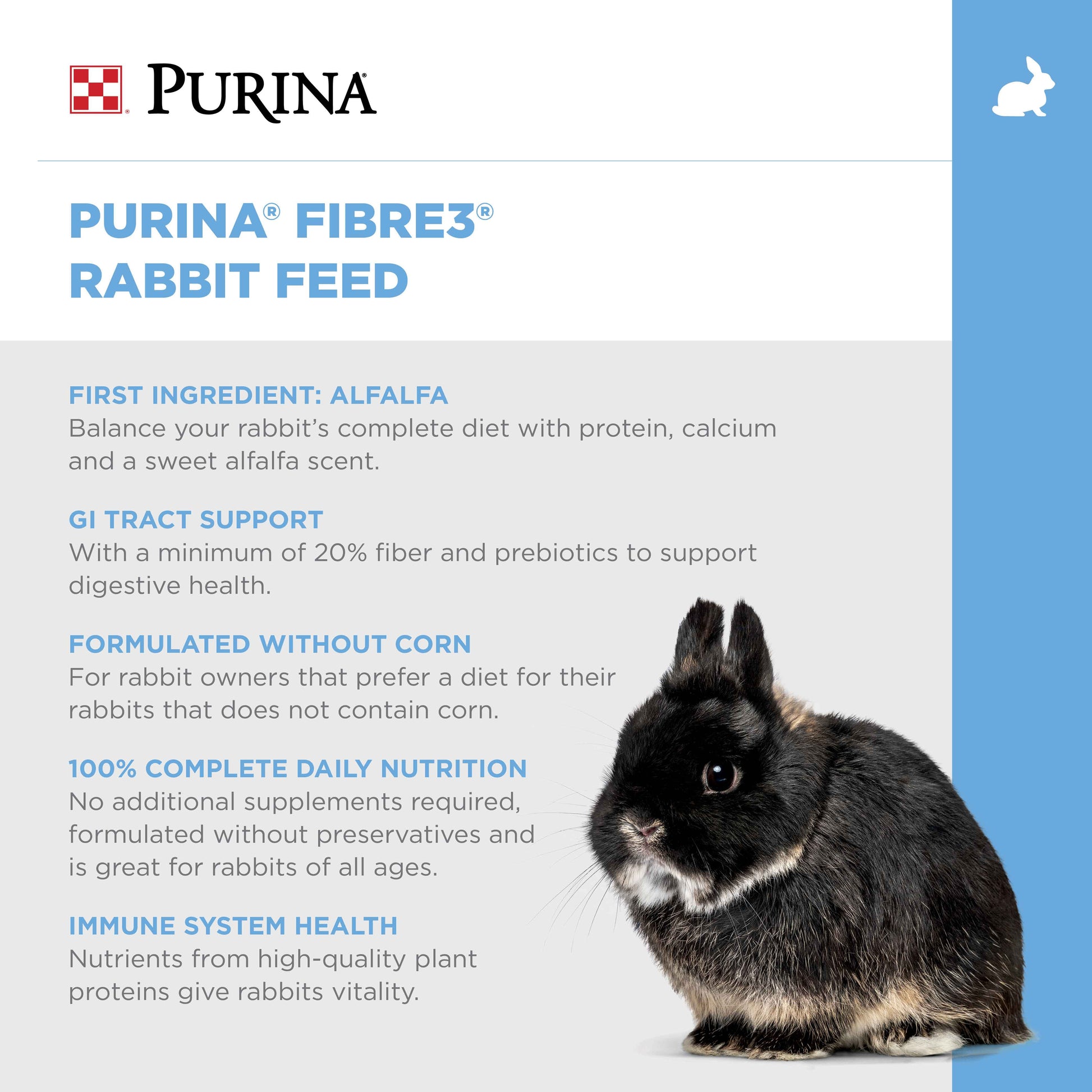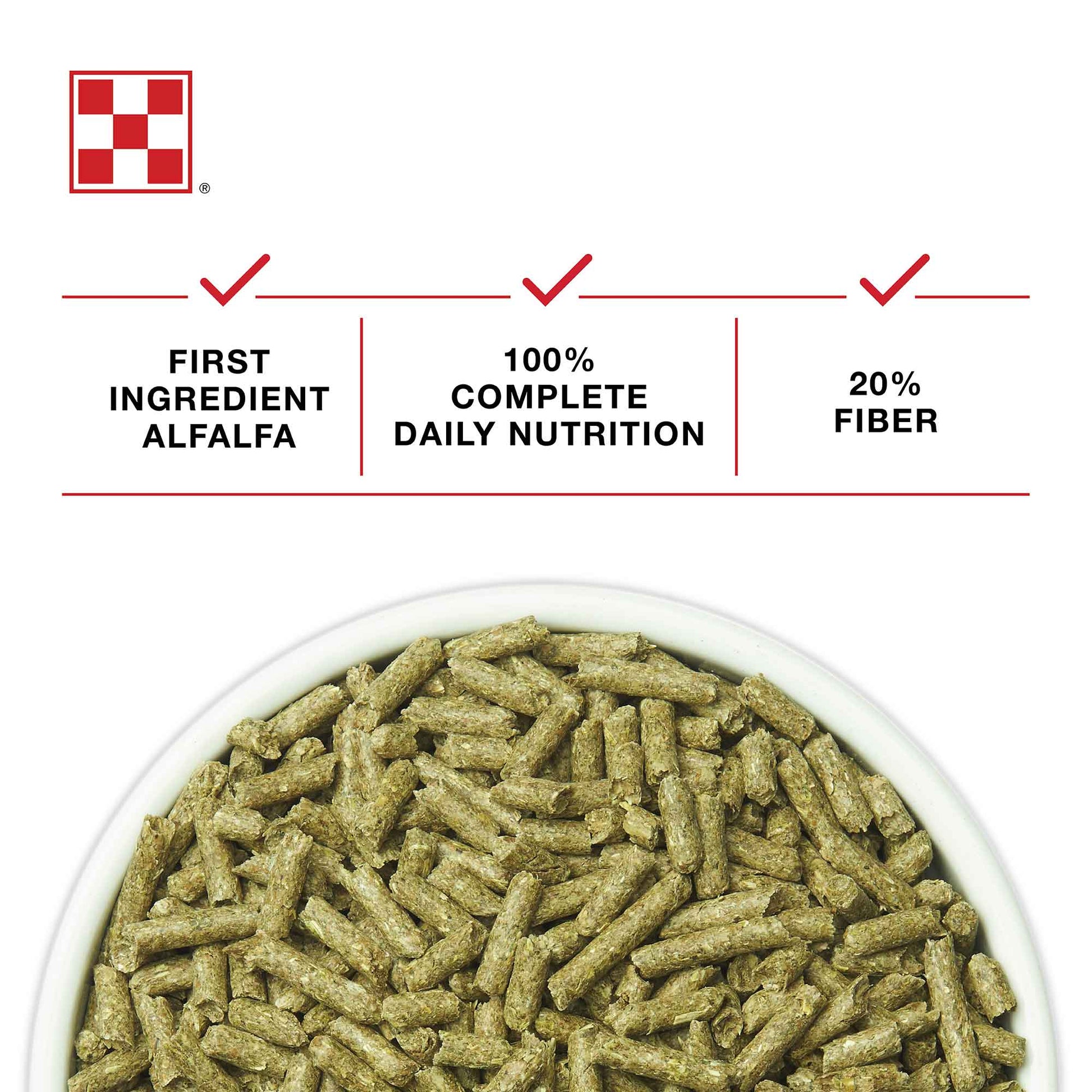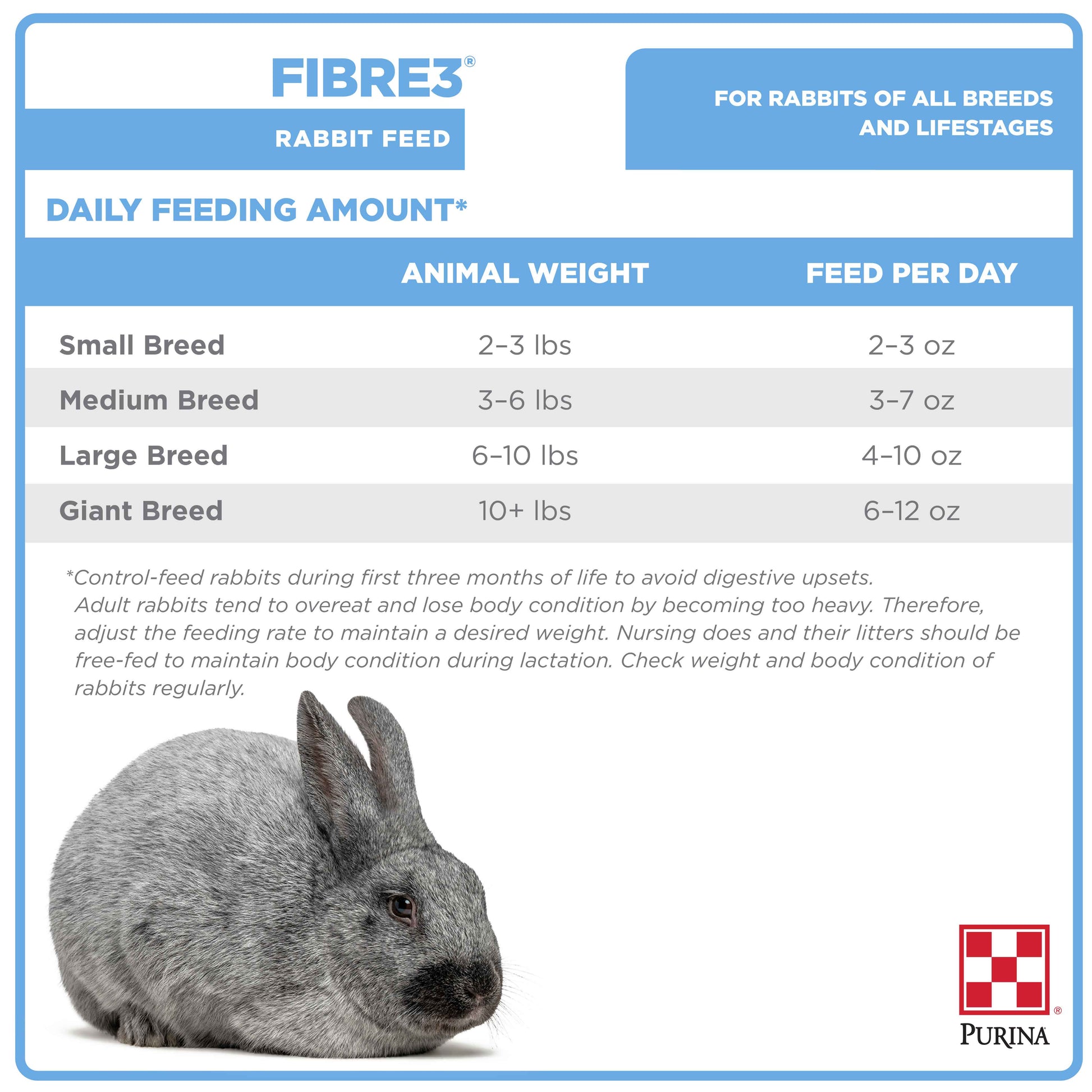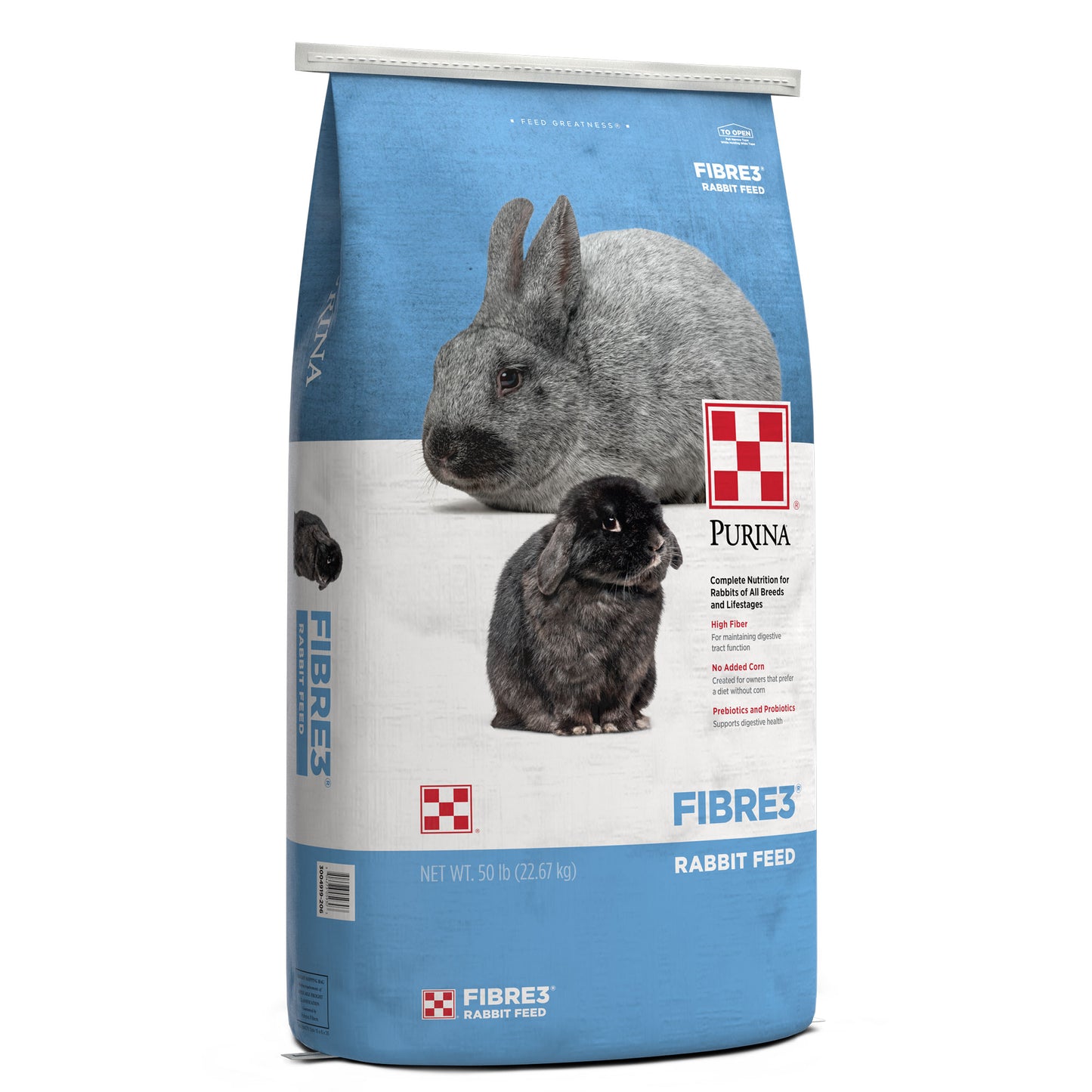
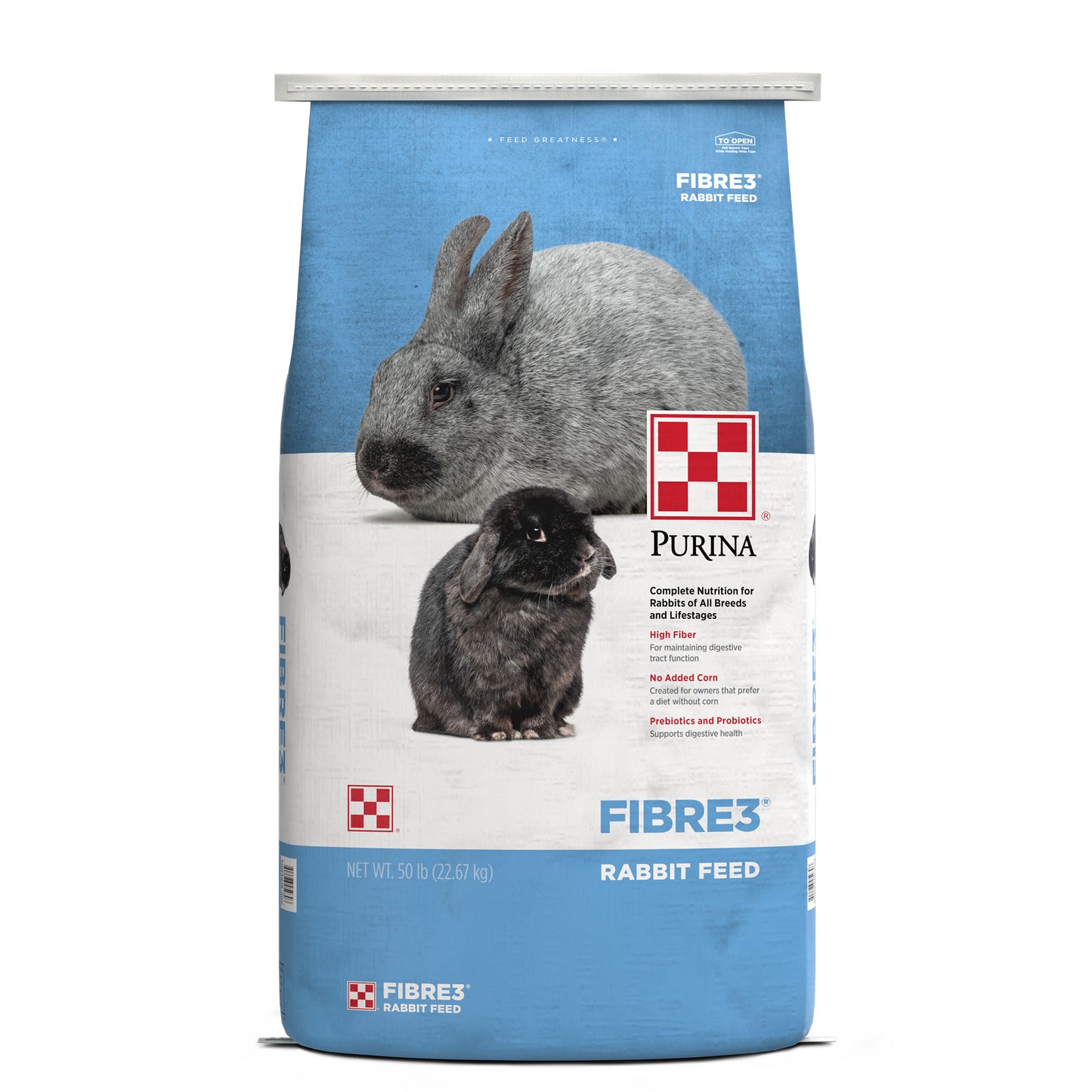
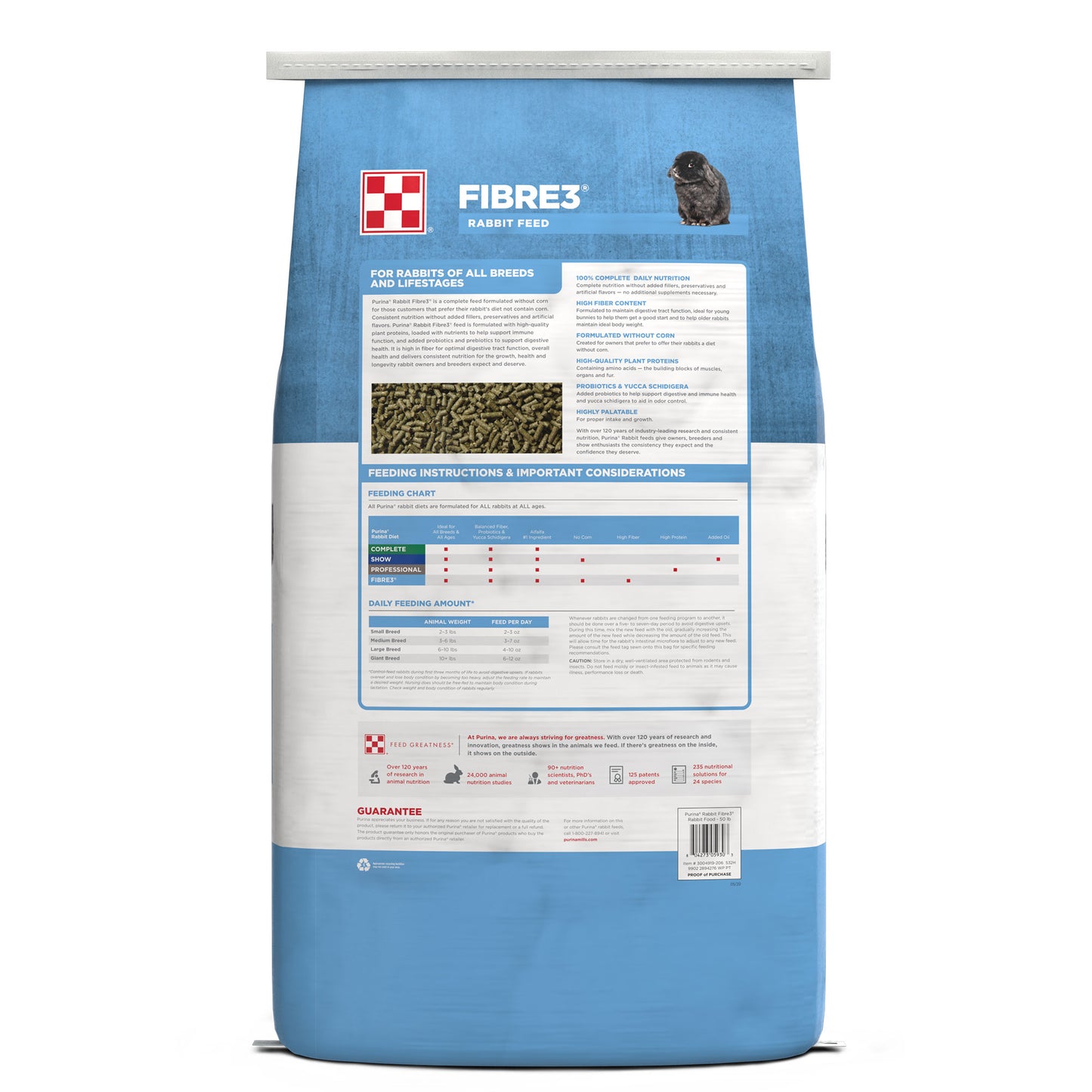
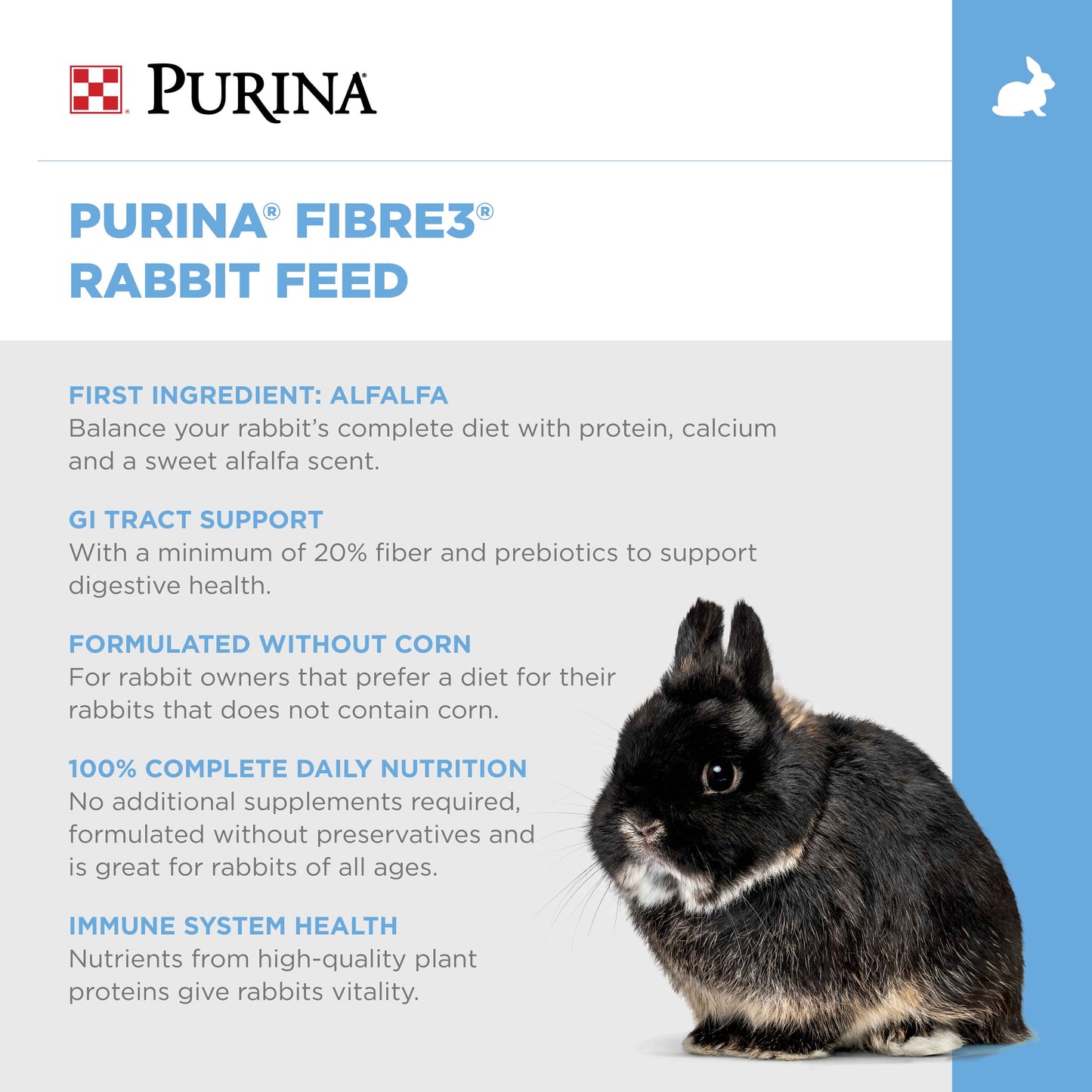
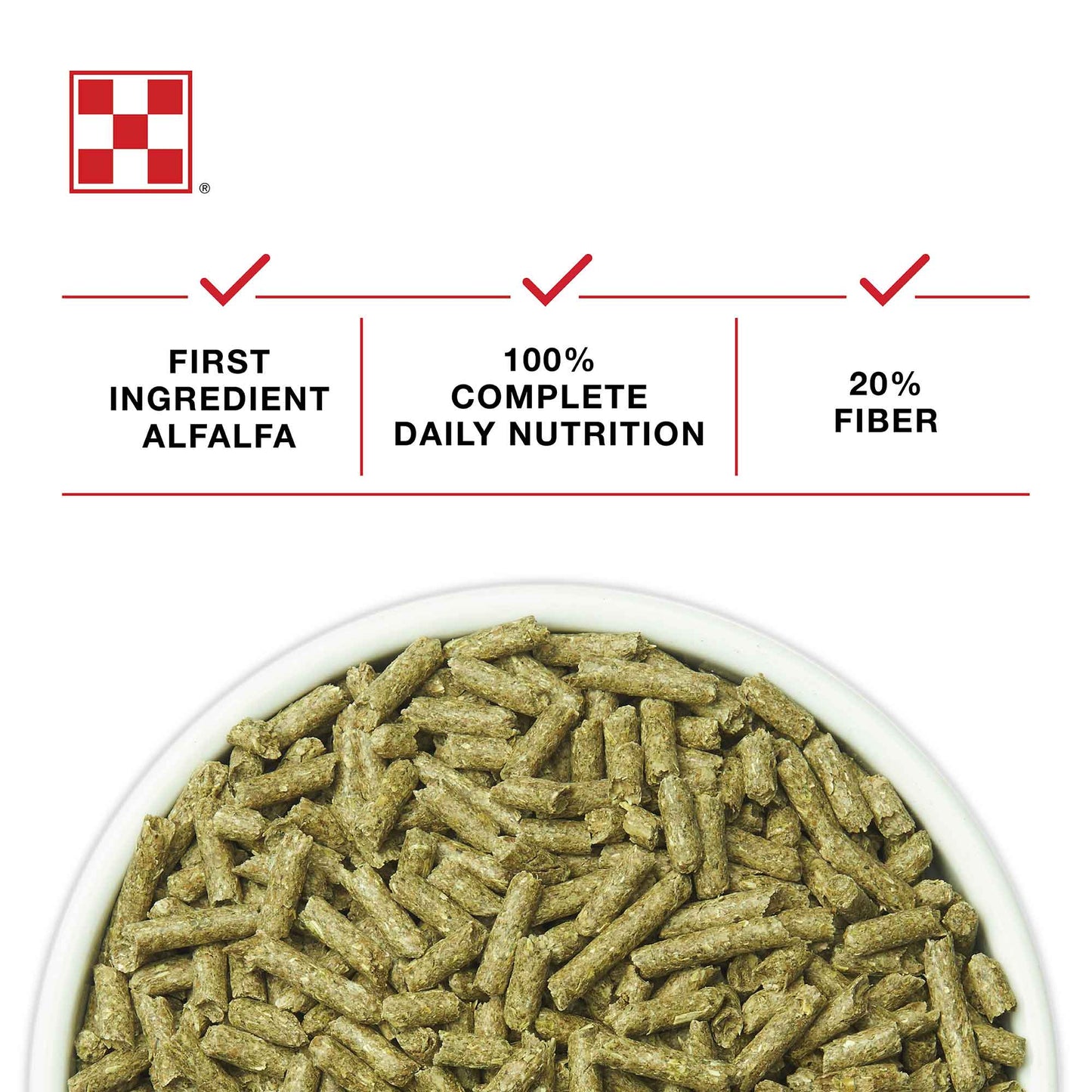
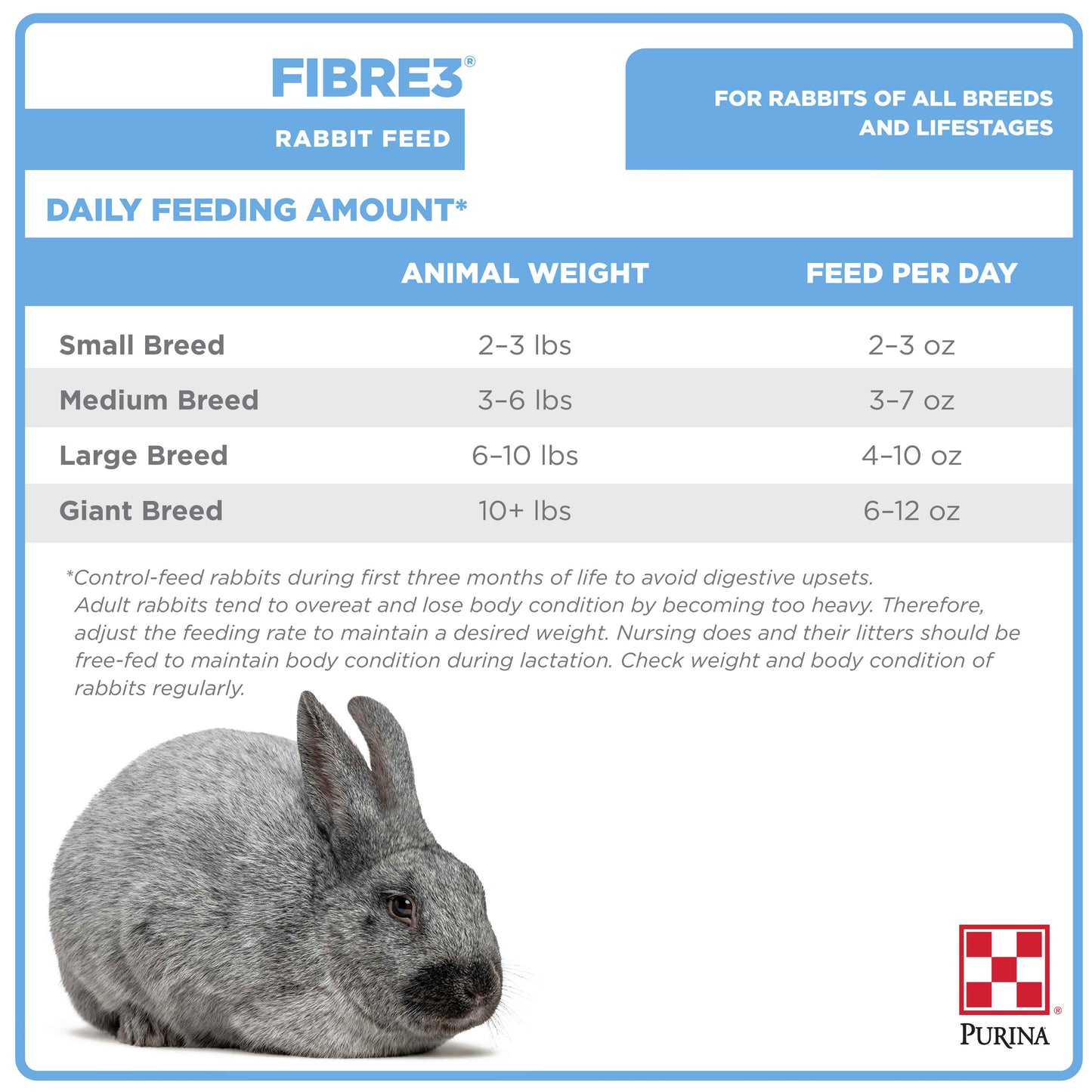
| Nutrient | Min / Max | Amount |
|---|---|---|
| Crude Protein | MIN | 15.00% |
| Crude Fat | MIN | 2.00% |
| Crude Fiber | MAX | 25.00% |
| Calcium (Ca) | MIN | 0.65% |
| Calcium (Ca) | MAX | 1.15% |
| Phosphorus (P) | MIN | 0.50% |
| Salt (NaCl) | MIN | 0.25% |
| Salt (NaCl) | MAX | 0.75% |
| Vitamin A | MIN | 4800 IU/LB |
Purina® Fibre3® Rabbit is a complete feed suitable for all classes of rabbits. Feed requirements of rabbits will vary depending on their body weight, environmental temperatures, type of housing, and stage of production, i.e., maintenance, gestation, lactation, growth.
Adult non-lactating rabbits should be fed approximately 1/2 ounce of feed per pound of body weight. Offer the amount they will clean up in approximately one-hour (30 minutes if feeding twice daily) and adjust the amount fed to maintain condition.
Nursing does and their litters should be full-fed. Lactating does will consume 1 to 3 ounces per pound of body weight per day. Gradually increase the amount fed from kindling so at the time the litter is one week old the doe is consuming all of the feed she will eat.
Meat rabbits will consume an average of 4 to 5 ounces per day during the period from weaning to market. Plenty of fresh, clean water should be available to animals at all times.
Caution:
Store in a dry, well-ventilated area protected from rodents and insects. Do not feed moldy or insect-infested feed to animals as it may cause illness, performance loss or death. USE ONLY AS DIRECTED
Management Practices:
Follow these management practices:
- Feed requirements of rabbits will vary depending on their body weight, environmental temperatures, type of housing, and stage of production (maintenance, gestation, lactation, growth).
- Offer rabbits the amount they will clean up in approximately one hour (30 minutes if feeding twice daily) and adjust the amount to maintain condition. Do not overfeed.
- Mature rabbits tend to overeat, become too heavy and lose body condition. Adjust feed rates to maintain desired weight.
- Young rabbits will begin to consume feed when they come out of the nest box at approximately three weeks of age.
- Feeding programs are only as effective as the management practices followed.
- Provide plenty of fresh, clean water at all times.
- When changing animals from one feeding program to another, do so over a 5 to 7 day period. Mix the new feed with the old feed and gradually increase the amount of new feed mixed.
It is always good practice to wash hands thoroughly after feeding and/or handling animals. Contents of bag are not for human consumption. Contains a source of live (viable) naturally occurring microorganisms.
Purina has simplified our product offering, and this product is no longer available.
We recommend Purina Complete Rabbit Feed.
If you have questions about this feed or need nutritional advice for your animal, Purina nutritionists can help. Ask an Expert
| Nutrient | Min / Max | Amount |
|---|---|---|
| Crude Protein | MIN | 15.00% |
| Crude Fat | MIN | 2.00% |
| Crude Fiber | MAX | 25.00% |
| Calcium (Ca) | MIN | 0.65% |
| Calcium (Ca) | MAX | 1.15% |
| Phosphorus (P) | MIN | 0.50% |
| Salt (NaCl) | MIN | 0.25% |
| Salt (NaCl) | MAX | 0.75% |
| Vitamin A | MIN | 4800 IU/LB |
Purina® Fibre3® Rabbit is a complete feed suitable for all classes of rabbits. Feed requirements of rabbits will vary depending on their body weight, environmental temperatures, type of housing, and stage of production, i.e., maintenance, gestation, lactation, growth.
Adult non-lactating rabbits should be fed approximately 1/2 ounce of feed per pound of body weight. Offer the amount they will clean up in approximately one-hour (30 minutes if feeding twice daily) and adjust the amount fed to maintain condition.
Nursing does and their litters should be full-fed. Lactating does will consume 1 to 3 ounces per pound of body weight per day. Gradually increase the amount fed from kindling so at the time the litter is one week old the doe is consuming all of the feed she will eat.
Meat rabbits will consume an average of 4 to 5 ounces per day during the period from weaning to market. Plenty of fresh, clean water should be available to animals at all times.
Caution:
Store in a dry, well-ventilated area protected from rodents and insects. Do not feed moldy or insect-infested feed to animals as it may cause illness, performance loss or death. USE ONLY AS DIRECTED
Management Practices:
Follow these management practices:
- Feed requirements of rabbits will vary depending on their body weight, environmental temperatures, type of housing, and stage of production (maintenance, gestation, lactation, growth).
- Offer rabbits the amount they will clean up in approximately one hour (30 minutes if feeding twice daily) and adjust the amount to maintain condition. Do not overfeed.
- Mature rabbits tend to overeat, become too heavy and lose body condition. Adjust feed rates to maintain desired weight.
- Young rabbits will begin to consume feed when they come out of the nest box at approximately three weeks of age.
- Feeding programs are only as effective as the management practices followed.
- Provide plenty of fresh, clean water at all times.
- When changing animals from one feeding program to another, do so over a 5 to 7 day period. Mix the new feed with the old feed and gradually increase the amount of new feed mixed.
It is always good practice to wash hands thoroughly after feeding and/or handling animals. Contents of bag are not for human consumption. Contains a source of live (viable) naturally occurring microorganisms.
Reviews
You May Also Like

For the widest selection of Purina products – along with personal service and know-how – check with your local retailer.

